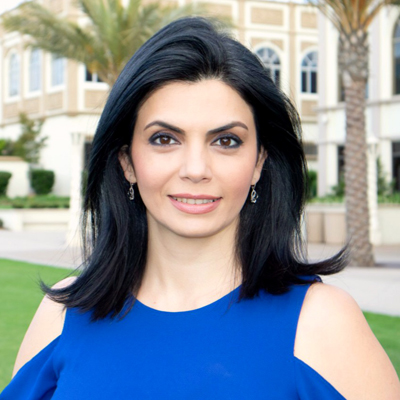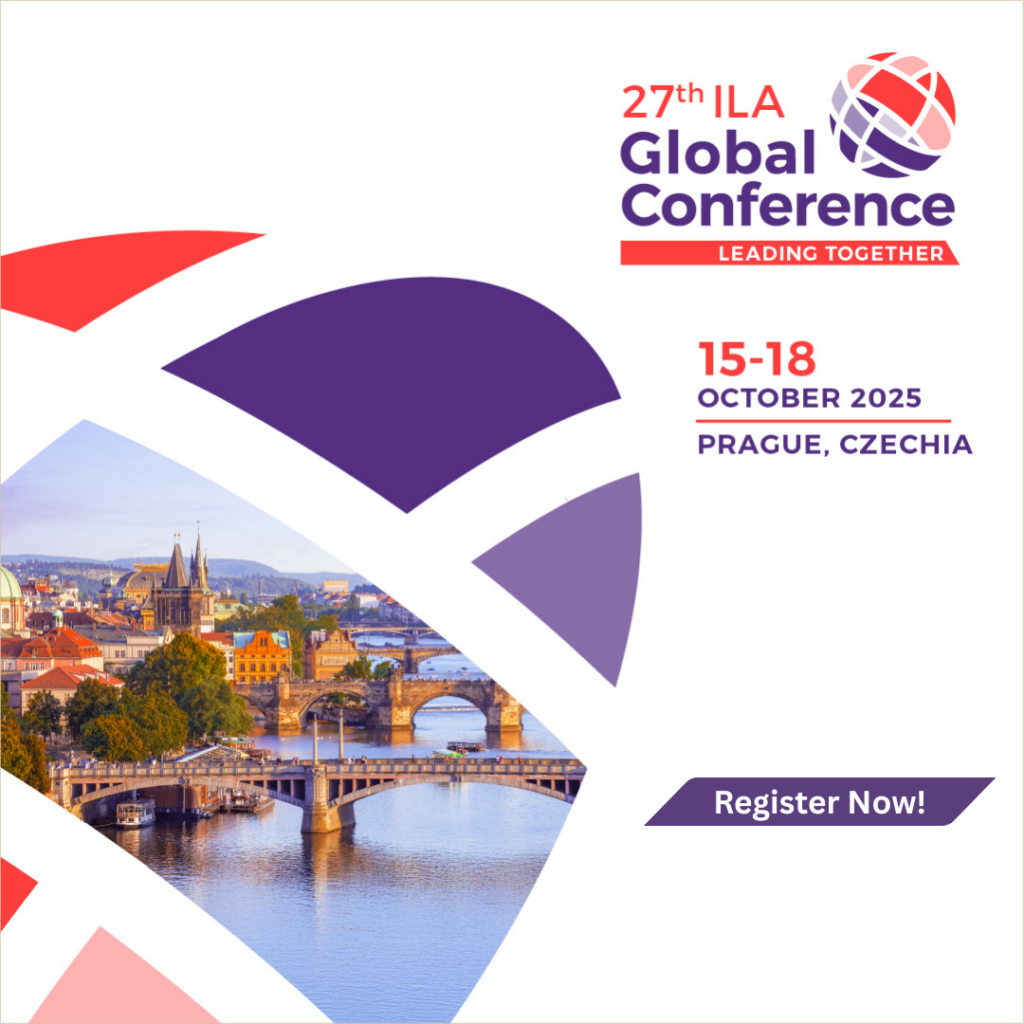
by Azedeh Davari, Certified Executive Leadership Coach; Faculty at the Center for Creative Leadership in San Diego
6 July 2021
Share this article:
Greetings!
This August, the ILA will offer the Leadership Education Academy (LEA) for the fourth time. I am honored and fortunate to be a new member of LEA’s global, experienced, and diverse group of facilitators. I join this group with a unique combination of academic, organizational, and community practice experience. As an organizational leadership consultant, my clients consist of multinational corporations, government agencies, universities, and international NGOs. Throughout my career, I have had the opportunity to design and deliver leadership development programs as well as diversity and inclusion initiatives for organizations in different countries and across many different cultures.
My early career started around 20 years ago as a food science and technology engineer working at a national research institute in Iran. Soon after I entered the workforce, I realized that the food and nutrition sector was a woman-dominated field, but the voice of women in leadership was clearly missing. Women would barely be recognized in higher level decision-making roles. I started immersing myself in learning about leadership and how, as a young scientist, I could change the status quo. That was the turning point in my personal and professional life — when I transitioned to be a leadership educator.
Over the past 10 years, I pursued a doctorate in Organizational Leadership and have been designing and delivering leadership programs in the U.S., Europe, Asia, and the Middle East. I have been intentional in combining my passion and experience to deepen the conversation around cultural understanding, inclusive workplace, racial justice, women empowerment, and personal and social identity and how they connect to leadership. I am committed to finding my voice as a woman of color and as a leader, as well as empowering those whose voices are not being heard and recognized enough in the workforce and in society.
I currently serve as a Leadership Solution Facilitator at the Center for Creative Leadership (CCL) based out of the San Diego campus. I facilitate open enrollment as well as customized solutions for organizations focusing on developing self-awareness, leadership and organizational change, women empowerment, group relations, conflict management, and diversity and inclusion. I also serve as faculty and executive coach at RISE San Diego Urban Leadership Fellows Program. RISE’s unique goal and commitment is to identify and empower a generation of leaders who will not only bring our urban communities up but also bring them together. I am also an adjunct professor at Pepperdine Graduate School of Education and Psychology where I teach a doctoral course on Personal Leadership, Ethics, and Social Justice.
I applied to be an LEA facilitator for the 2020 academy hoping to share some of my global and practical perspectives and, more importantly, to co-create and engage in a deeper learning experience with my colleagues and participants. So far, I am fascinated by my colleagues’ intentionality, work ethics, and collaborative spirit.
I am writing this piece to introduce myself to you all after the world has spent more than a year dealing with the COVID-19 pandemic. It makes me pause and reflect on how, together, we can incorporate reflective learning and Adaptive Leadership as a fundamental aspect of what we practice at LEA. I realize it is a time when “I” needs to shift to “We.” As this public health crisis continues to unfold, people have and are suffering from the circumstances and are adapting to new norms and behaviors. Those of us in education likely experienced a transition to online teaching. Globally, the world seems to be extremely fragile and powerless in the face of crises such as the pandemic. I believe we collectively have the potential, power, and opportunity to make sense of crises like this and be part of a global shift.
As part of the LEA community, I am hoping that we can reflect on how we can be and how we can effectively perform in the space of not knowing. Given the Volatility, Uncertainty, Complexity, and Ambiguity of the current time, how can we be more prepared for the challenges a VUCA world holds in store? How do we hold safe space for ourselves, for our neighbors, families, colleagues, and students as we go through challenging times? How do we respond?
The COVID-19 pandemic illustrates that we, as individuals and collectives, can no longer operate the same way as before. We have to pay more attention to what is actually happening every moment. Change is the only constant factor. The pandemic created a situation that has many different interconnected parts and variables that are unknown. Issues of public health, racial justice, financial instability, emotional distress, and educational accessibility are unexpected and unstable. We are not capable of predicting what exactly is about to happen in the future. For many, this brings a sense of anxiety and powerlessness. I wanted to share some of my thoughts as I reflect on the past year:
We are globally united. This time more than ever! It may be under a very painful circumstance, yet no matter where we live in the world, no matter any borders and boundaries, any climate, any language we speak, or any religion we practice, we feel the same pain; we seek the same solution. It is a call for us to transcend from “us” versus “others” and embrace oneness and unity. This past year taught many of us to see the darkness of racism and discrimination and showed us how ugly that it. As we strive to recover from the pandemic, we must find ways to build a renewed social construct based on inclusivity and sustainability.
It may be under a very painful circumstance, yet no matter where we live in the world, no matter any borders and boundaries, any climate, any language we speak, or any religion we practice, we feel the same pain; we seek the same solution.
We all needed to pause. During the pandemic, many of us discovered that being is far more important than doing. We checked-in with ourselves, rediscovered what matters most, and breathed. During lockdowns, we also provided space to let the earth, trees, ocean, blooming spring flowers, and all other species breathe more deeply. Once again, we could see blue sky and hear singing birds.
We need more love, kindness, and compassion. Many of us experience different emotions such as fear, anger, sadness, anxiety, discomfort, stress, pain, and so many more. We collectively experienced losing loved ones, jobs, homes, what we knew to be a normal life, and we were left with the challenge of homeschooling our kids, transitioning to online education, caring for elders, and giving birth to newborns. In a fearful time of social distancing, every single act of kindness, any way we could connect and care for others and show love and compassion was a ray of light and hope. As we experience a shadow, we can still access and offer our inner lights.
We have to let go of past patterns and habits. They no longer serve us! One of my favorite leadership books is Theory U by Otto Scharmer. In it he explains ways to lead the future as it emerges. The key is to observe what is happening in the field and explore patterns and past behaviors. In order to be connected to the core, which he calls Presencing, we are required to let go of what no longer serves us. The pandemic reminds us of so many behaviors and patterns that are not working, that are not allowing us to access new ways of being and creative ways of solving our challenges. We cannot fix this issue with any technical, previously known solution. We have to pause and co-create new ways that are unknown to meet the challenges of this century.
We are invited to see new ways of being and becoming. We need to be more intentional and focused on co-creating a present and future that is more inclusive and connected to our essence. We are part of a bigger global transformation to something that is unknown. According to the book Presence (Senge et al., 2004), by encouraging deeper levels of learning, we create an awareness of the larger whole, leading to actions that can help to shape its evolution and our future.
I am hoping that all of us will emerge from this challenging time with a higher level of individual and collective consciousness. Being part of the team of LEA facilitators, I am excited to experience the intentional and learning mindset in preparing for and executing this year’s academy. I look forward to meeting you virtually this August and exploring the deeper work of leadership together.
Azadeh Davari
References:
Heifetz, R.A., Linsky, M., Grashow, A., (2009). The Practice of Adaptive Leadership: Tools and Tactics for Changing Your Organization and the World. Harvard Business Press.
Kail, E. G , (2011). Leading Effectively in a VUCA Environment: A is for Ambiguity. Harvard Business Review. https://hbr.org/2011/01/leading-effectively-in-a-vuca-1?referral=03759&cm_vc=rr_item_page.bottom
Scharmer, O. (2016). Theory U: Leading from the Future as it Emerges. 2nd Edition. Berrett-Koehler Publishers. Inc.
Senge, P.M., Scharmer, O., Jaworski, J., Flowers, B.S., (2004). Presence: An Exploration of Profound Change in People, Organizations, and Society. Crown Publishing Group.

Azedeh Davari, Certified Executive Leadership Coach; Faculty at the Center for Creative Leadership in San Diego
Develops customized leadership solutions that focus on self-awareness, conflict management, intercultural understanding, and diversity and inclusion.


